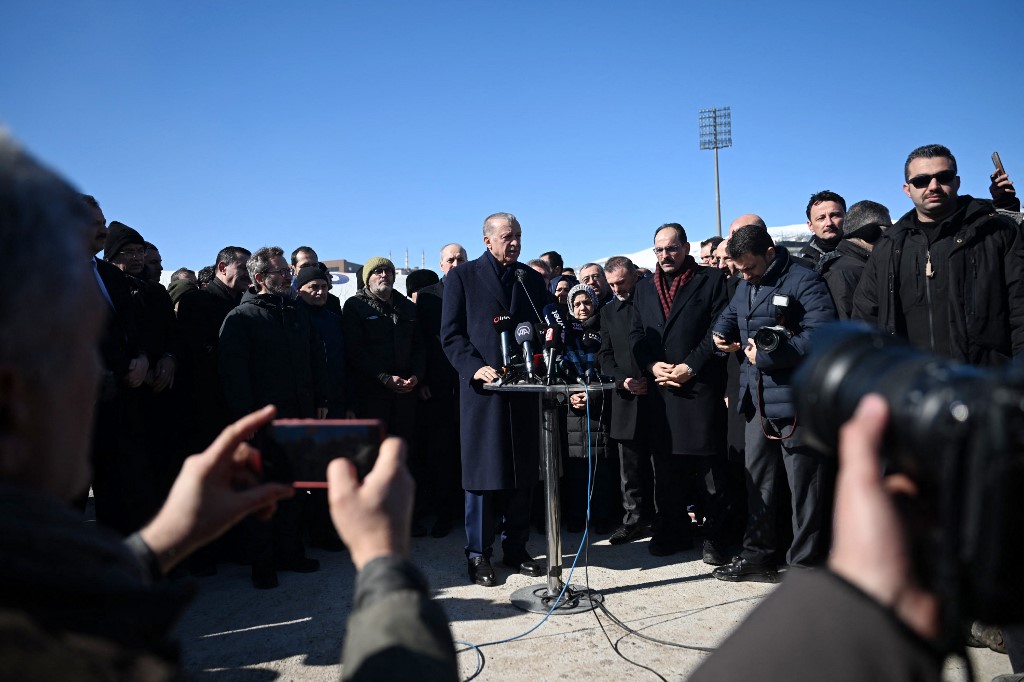Turkish media coverage of search and rescue efforts following Monday’s massive earthquake that killed more than 22,000 people in Turkey and Syria has highlighted the extent of the pressure on journalists in the country.
The 7.8-magnitude earthquake occurred early Monday near the Turkish-Syrian border.
The Turkish government and its leader, President Recep Tayyip Erdoğan, have been criticized by earthquake survivors for not providing enough rescue workers and humanitarian aid in the first days after Turkey’s biggest disaster in nearly a century.
Erdoğan, who on Tuesday declared a state of emergency for the 10 provinces affected by the quake, said he was “taking note of all the lies and distortions and will open his notebook when the time comes.”
Erdoğan’s remarks have been interpreted by many as an attempt to silence criticism of his government, which they say has responded poorly to the disaster.
When Turks turned on their televisions or reached for their newspapers, they saw mostly miracle rescues, the successes of rescuers and emphasis on the apocalyptic scale of the disaster, apologetic for what many see as the government’s poor response.
When correspondents from pro-government media handed microphones to earthquake victims on the ground, they either turned away to suppress criticism when they heard complaints about inadequate aid, or the networks they worked for interrupted coverage to silence victims recounting their ordeal and criticizing the authorities’ inadequate response.
Despite the best efforts of the pro-government media, there were glitches on the TV screen undermining the government’s narrative.
On a live broadcast of the pro-government Show TV on Wednesday, news anchor Dilara Gönder railed at a geological engineer’s comment that the deadly quake was a “lesson” for future natural disasters.
“A lesson with so many deaths? Didn’t we have enough deaths from this lesson in 1999? Is this latest quake supposed to be another lesson? We keep getting this lesson, but we never seem to learn it,” Gönder lamented, referring to a 7.4-magnitude earthquake in 1999 that struck Turkey’s Marmara region, leading to the death of more than 17,000 people.
Many expected Show TV to fire the news anchor, but she announced the next day that she had quit her job without saying why.
For those who know the state of press freedom in Turkey, this comes as no surprise.
Turkey was ranked 149th among 180 countries in the Reporters Without Borders (RSF) 2022 World Press Freedom Index, with the prominent press organization warning about rising authoritarianism in the country and declining media pluralism.
Critics accuse the Turkish government of having taken almost complete control of the Turkish media following a failed military coup in 2016.
The government closed down hundreds of media outlets and imprisoned scores of critical journalists under the pretext of fighting the coup.
Journalists risk losing their jobs, being harassed by the judiciary or being jailed for even the slightest criticism of the government.
Journalists covering the aftermath of the earthquake also faced challenges and restrictions.
Turkish prosecutors have launched investigations into two journalists due to their critical coverage of the government’s response to the disaster, while at least four journalists were detained while reporting and subsequently released.
The International Press Institute (IPI), a global network for independent journalism, has expressed concern about restrictions on independent media coverage of the recent earthquake. The IPI has called on Turkish authorities to allow journalists to report freely on the aftermath of the disaster and to lift all restrictions on social media, which are important channels of communication in times of crisis.

